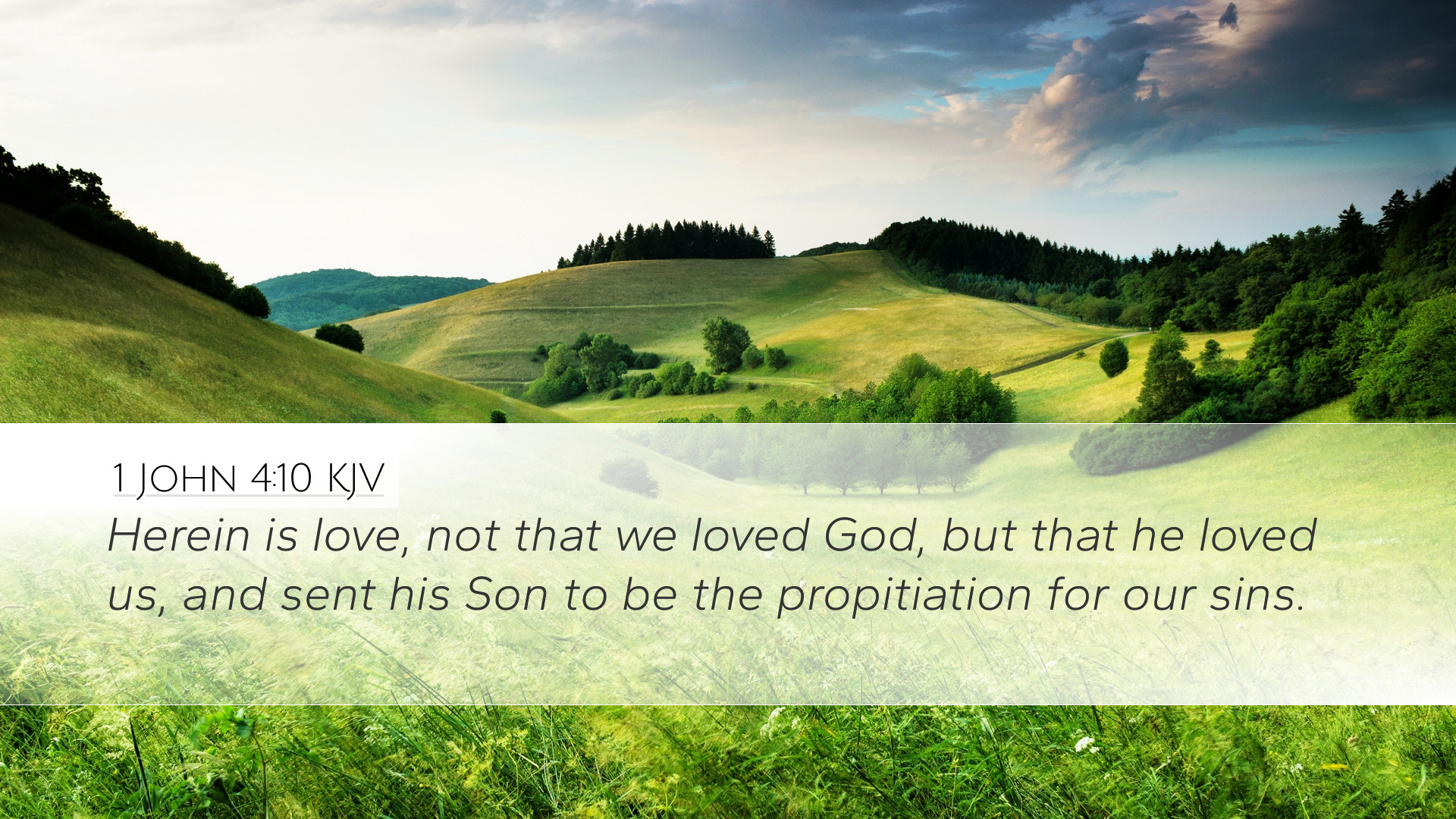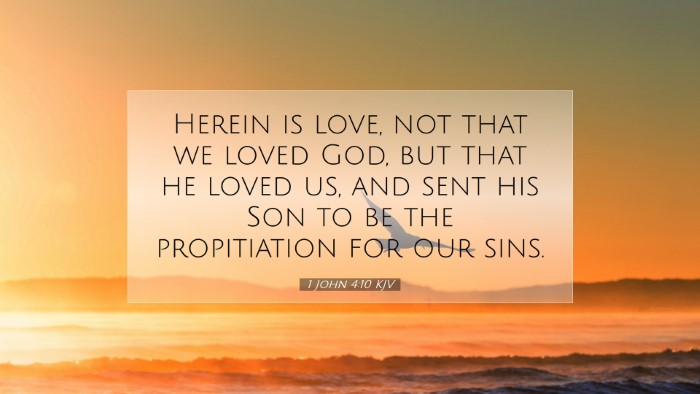Old Testament
Genesis Exodus Leviticus Numbers Deuteronomy Joshua Judges Ruth 1 Samuel 2 Samuel 1 Kings 2 Kings 1 Chronicles 2 Chronicles Ezra Nehemiah Esther Job Psalms Proverbs Ecclesiastes Song of Solomon Isaiah Jeremiah Lamentations Ezekiel Daniel Hosea Joel Amos Obadiah Jonah Micah Nahum Habakkuk Zephaniah Haggai Zechariah Malachi1 John 4:10
1 John 4:10 KJV
Herein is love, not that we loved God, but that he loved us, and sent his Son to be the propitiation for our sins.
1 John 4:10 Bible Commentary
Commentary on 1 John 4:10
Bible Verse: "Herein is love, not that we loved God, but that he loved us, and sent his Son to be the propitiation for our sins." (1 John 4:10)
Introduction
The Apostle John's first epistle presents profound theological insights on the nature of God, love, and redemption. In chapter 4, verse 10, John encapsulates the essence of divine love and the sacrificial nature of Christ's atonement. This verse serves as a cornerstone for understanding both the character of God and the response expected from believers.
The Nature of Divine Love
Matthew Henry's Commentary: John begins by clarifying the origin of love; it is not humanity's love for God that establishes the foundation of our relationship with Him, but rather God's unconditional love for humankind. This highlights God's initiative in the covenant of grace.
Albert Barnes adds: The essence of love is revealed in God's actions rather than in mere emotions. God's love is proactive and sacrificial, as shown in His sending of His Son, which is a profound testimony to His character.
Adam Clarke elaborates: True love is characterized by selflessness, and God's love exemplifies this perfectly. This love does not depend on human merit or effort, for it was shown to us while we were still sinners (Romans 5:8).
The Role of Jesus Christ
Matthew Henry observes: The term "propitiation" suggests a satisfaction of the divine justice. Jesus Christ is not only the vehicle of God's love but also the means by which our sins are atoned for. His sacrifice was essential for reconciling God's holiness with His love.
Albert Barnes explains: The mention of propitiation underlines the gravity of sin and the seriousness with which God addresses it. Christ's atonement is the pivotal act that affirms God’s love while upholding justice, demonstrating that love does not compromise righteousness.
Adam Clarke encourages further exploration: Understanding propitiation involves recognizing that it is through Jesus that we, who were once enemies of God, are transformed into His children. This transformation is a key aspect of the believer's identity in Christ.
Theological Implications
This verse prompts believers to reflect on several crucial theological themes:
- The Initiative of God: God's love is not a response to human action but rather a prior initiative that seeks to create a relationship with humanity.
- The Nature of Sacrifice: The sacrificial system in the Old Testament points forward to Christ's ultimate sacrifice, which fulfills the need for atonement.
- Human Response to Divine Love: Understanding God’s love necessitates a response from us. We are called to love God in return, as well as to love one another. This love is not just an emotion but a tangible action.
Pastoral Application
For pastors and spiritual leaders, this passage underscores the importance of teaching about both the nature of God’s love and the depth of Christ’s sacrifice. Emphasizing God's initiative in loving humanity creates a foundation for evangelism and discipleship.
Matthew Henry reminds us: Pastors should proclaim that God’s love is available to all and must not shy away from presenting the gravity of sin and the necessity of grace.
Albert Barnes highlights: The church's mission is to embody and reflect God’s love through outreach and community engagement, demonstrating that this love transforms lives and societies.
Theological Reflection for Students and Scholars
For theological students and scholars, 1 John 4:10 serves as a rich text for examining Christology, soteriology, and the attribute of love within the nature of God. It challenges scholars to delve deeper into the implications of divine love and its transformative power within the believer's life.
Adam Clarke would encourage deep reflection: The understanding of propitiation broadens the discourse surrounding the implications of redemption. Scholars should consider how this verse intersects with both Old Testament sacrificial practices and New Testament teachings on grace.
Conclusion
1 John 4:10 presents a powerful reminder of who God is—loving, just, and merciful. By sending His Son as a propitiation for our sins, God has provided a clear demonstration of His love that transcends human understanding. As believers, we are called to accept this love and share it with others, embodying the grace we've received.
In summary, this verse compels us to reflect on the enormity of God's love and the implications of Christ's sacrifice, prompting both worship and action within our faith communities.


